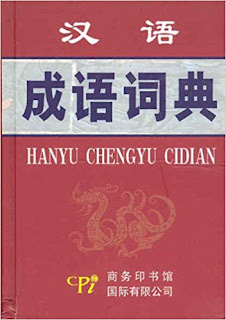Chéngyǔ 成语
The Chinese language is rich in idioms, and although it is possible to converse in non-idiomatic standard Chinese, a foreign learner with only a superficial knowledge of Chinese idioms will be at a serious disadvantage in reading, and even more so when taking part in discussions. Apart from idioms, there are also the allegorical rhymes, onomatopoeia words, words from regional dialects, popular sayings, proverbs, and most importantly the literature—the vernacular and classical Chinese, that will catapult your language to the next level.
By idiom I am referring to what is called 成语(chéngyǔ) in standard Chinese. Like an idiom in English, we can define a 成语 as a combination of words with a special meaning that generally cannot be inferred from its separate parts. The Enlarged Dictionary of Chinese Idioms 中国成语大语词典 I have on my table here lists over 18,000 entries. Many 成语 but not all, are made up of four characters and for this reason the term is sometimes translated as 'a four character idiom.'
Let’s take a look at a two random examples:
1. 车水马龙 (chēshuǐmǎlóng). If we literally translate the idiom it means 'chariots, water, horses, dragons.' Clearly, it is rather difficult if not impossible to figure out this meaning from the separate words. In other words, the meaning of the whole idiom is different from its parts. The sentence has two meanings, a literal one, which means very little, and a metaphorical one which is the idiom. This idiom can be traced back to the Han dynasty when an empress described a stream of horses and carriages on a busy street: 'the chariots are like flowing water, the horses moving to and fro like dragons.' ('车如流水, 马如游龙').
If we bring the idiom to the present, it refers to an incessant or endless stream of cars—heavy traffic on the road, for example, or a scene crowded with people and vehicles. Compare: 人山人海 (lit: 'people mountain, people sea').
2. 见钱眼开. Unlike the first example, if we literally translate this idiom we can guess its meaning: ‘see money, eyes open', in other words, avaricious. Another example of a 成语 that we can pretty well guess its meaning if we read each character literally is 人生如寄 (rénshēngrújì): living in the mortal world is like a sojourner in a hotel, that is, life is short.
If you read the news whether that be that actual news print form (how old-fashioned is that?) or online, start collecting idioms. Many of them will be bookish idioms in contrast to colloquial ones, but keep an eye for one’s that keep cropping up in print as well as one’s your Chinese friends use.



Comments
Post a Comment